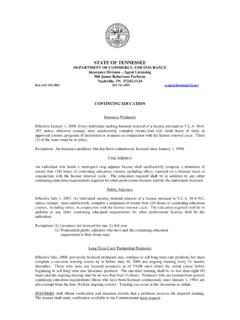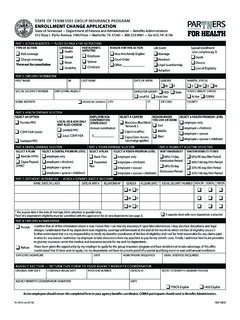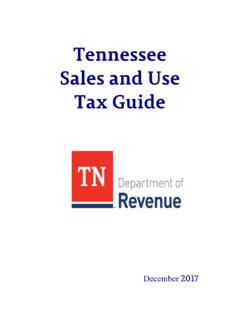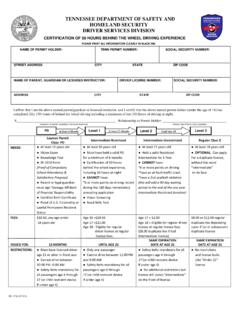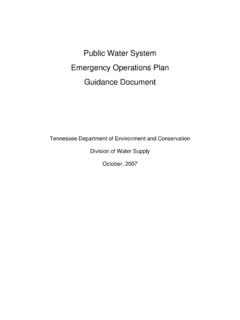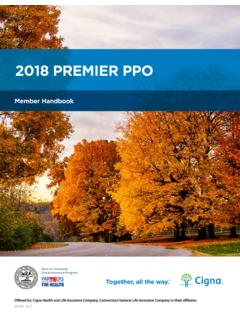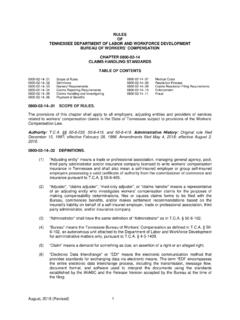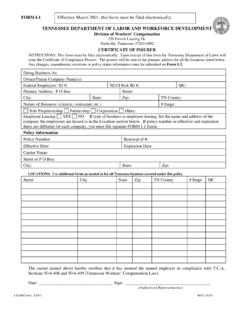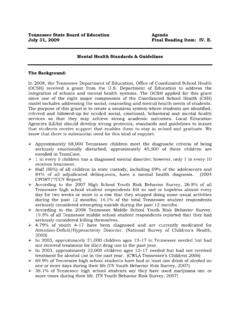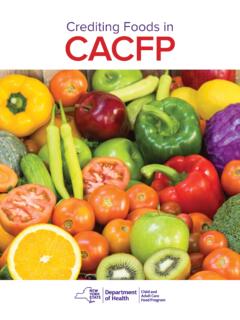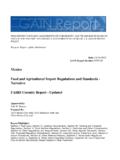Transcription of FARMERS MARKETS - Tennessee
1 STATE COMPLIANCE GUIDEFARMERS MARKETSSPRING 2019 Keeping Tennessee the Ground UpFor more information contact: Tennessee Department of AgricultureConsumer & Industry Services Division436 Hogan Road | Nashville, TN 37220615-837-5150 | 2 Table of Contents INTRODUCTION .. 3 GENERAL CONSIDERATIONS .. 3 TYPES OF Fruits and Vegetables .. 4 Food for Immediate Consumption .. 4 Processed Foods .. 4 FOOD Sorghum Molasses .. 5 Honey .. 5 Dairy .. 5 Juice .. 6 Farm Eggs .. 6 Meat and Meat Products .. 6 Farm Based Retail Meat .. 6 Seafood .. 7 Poultry .. 8 Nuts .. 8 Shelled Peas .. 8 OTHER Soaps .. 8 Pet Food .. 8 Plants .. 9 Livestock .. 9 Dogs and Cats .. 9 2 3 RULES FOR FOOD SOLD AT FARMERS MARKETS : A GUIDANCE DOCUMENT INTRODUCTION A safe and wholesome food supply is a primary mission of the Tennessee Department of Agriculture (TDA).
2 All food sold in Tennessee comes from an approved source inspected and permitted by the appropriate regulatory authority. There are some exceptions as explained in following sections. This document is not intended to be the all-inclusive final authority on food safety. It points the reader to laws and source materials that give guidance to FARMERS , market management, and potential vendors. More detailed information on beginning a food manufacturing business or how to market products is available from the Center for Profitable Agriculture, and the University of Tennessee Extension Service, References in this document to , Tenn. Comp. R. & Regs., and CFR are to Tennessee Code Annotated, Tennessee Comprehensive Rules and Regulations, and the Code of Federal Regulations.
3 Specific sections may be accessed at , , and Individual FARMERS MARKETS may have their own rules in addition to those mentioned in this document. GENERAL CONSIDERATIONS All food, except fresh fruits and vegetables, sold at FARMERS MARKETS must be properly labeled. ( 53-1-105). The label must contain: The name and place of business of the manufacturer, packer or distributor; An accurate statement of the quantity of contents in term of weight, measure or count (if an item is sold in random weight packages, the label must contain the price per pound, the net weight and the total price)( 47-26-917); The common or usual name of the food; In case it is fabricated from two (2) or more ingredients, the common or usual name of each such ingredient; and If the food product contains one of the eight major food allergens, milk, eggs, fish, Crustacean shellfish, tree nuts, peanuts, wheat and soy, that ingredient must be shown on the label.
4 (21 USC 343(w)) No food shall be sold at a FARMERS market that contains poisonous or deleterious substances or that is adulterated in anyway. ( 53-1-104 4 TYPES OF FOOD FRUITS and VEGETABLES Unprocessed fruits and vegetables in their raw or natural state with only a minimal amount of cutting or trimming necessary for harvesting are exempt from permitting and inspection in Tennessee . ( 53-8-203). The federal Food Safety Modernization Act has placed new requirements on large scale produce growers who conduct more than $25,000 in sales per year. If you think you may fall into this category contact (615) 837-5193. FOOD FOR IMMEDIATE CONSUMPTION Products sold for immediate consumption on site like restaurants or concessions stands are under the jurisdiction of the local health department in each county.)
5 ( 68-14-704) PROCESSED FOODS Processed foods in any form, packaged for resale, and offered for sale at a FARMERS market must come from a licensed and inspected facility unless the food is from a facility that is exempt from licensure by meeting the following criteria: The food is not potentially hazardous, as defined by departmental regulation; The person is not subject to any license or permit requirements under the Tennessee Egg Law ( 53-2-107), the Dairy Law of the State of Tennessee ( 53-3-105; 53-3-106), the Tennessee Meat and Poultry Inspection Act ( 53-7-216; 53-7-220), or the Tennessee Retail Food Safety Act ( 53-8-206); The person introduces food into commerce only through direct retail sales to end consumers in the state; The person employs no regular, full-time employees for the manufacturing, processing, packing, or holding of food; and Prior to introducing the food into commerce, the person labels the food in accordance with this part and regulations promulgated by the commissioner.
6 "Non-potentially hazardous food" means jam, jellies, candy, dried mixes and other such food that do not meet the definition of potentially hazardous food. 3 3 RULES FOR FOOD SOLD AT FARMERS MARKETS : A GUIDANCE DOCUMENT INTRODUCTION A safe and wholesome food supply is a primary mission of the Tennessee Department of Agriculture (TDA). All food sold in Tennessee comes from an approved source inspected and permitted by the appropriate regulatory authority. There are some exceptions as explained in following sections. This document is not intended to be the all-inclusive final authority on food safety. It points the reader to laws and source materials that give guidance to FARMERS , market management, and potential vendors. More detailed information on beginning a food manufacturing business or how to market products is available from the Center for Profitable Agriculture, and the University of Tennessee Extension Service, References in this document to , Tenn.
7 Comp. R. & Regs., and CFR are to Tennessee Code Annotated, Tennessee Comprehensive Rules and Regulations, and the Code of Federal Regulations. Specific sections may be accessed at , , and Individual FARMERS MARKETS may have their own rules in addition to those mentioned in this document. GENERAL CONSIDERATIONS All food, except fresh fruits and vegetables, sold at FARMERS MARKETS must be properly labeled. ( 53-1-105). The label must contain: The name and place of business of the manufacturer, packer or distributor; An accurate statement of the quantity of contents in term of weight, measure or count (if an item is sold in random weight packages, the label must contain the price per pound, the net weight and the total price)( 47-26-917); The common or usual name of the food; In case it is fabricated from two (2) or more ingredients, the common or usual name of each such ingredient; and If the food product contains one of the eight major food allergens, milk, eggs, fish, Crustacean shellfish, tree nuts, peanuts, wheat and soy, that ingredient must be shown on the label.
8 (21 USC 343(w)) No food shall be sold at a FARMERS market that contains poisonous or deleterious substances or that is adulterated in anyway. ( 53-1-104 4 TYPES OF FOOD FRUITS and VEGETABLES Unprocessed fruits and vegetables in their raw or natural state with only a minimal amount of cutting or trimming necessary for harvesting are exempt from permitting and inspection in Tennessee . ( 53-8-203). The federal Food Safety Modernization Act has placed new requirements on large scale produce growers who conduct more than $25,000 in sales per year. If you think you may fall into this category contact (615) 837-5193. FOOD FOR IMMEDIATE CONSUMPTION Products sold for immediate consumption on site like restaurants or concessions stands are under the jurisdiction of the local health department in each county.)
9 ( 68-14-704) PROCESSED FOODS Processed foods in any form, packaged for resale, and offered for sale at a FARMERS market must come from a licensed and inspected facility unless the food is from a facility that is exempt from licensure by meeting the following criteria: The food is not potentially hazardous, as defined by departmental regulation; The person is not subject to any license or permit requirements under the Tennessee Egg Law ( 53-2-107), the Dairy Law of the State of Tennessee ( 53-3-105; 53-3-106), the Tennessee Meat and Poultry Inspection Act ( 53-7-216; 53-7-220), or the Tennessee Retail Food Safety Act ( 53-8-206); The person introduces food into commerce only through direct retail sales to end consumers in the state; The person employs no regular, full-time employees for the manufacturing, processing, packing, or holding of food; and Prior to introducing the food into commerce, the person labels the food in accordance with this part and regulations promulgated by the commissioner.
10 "Non-potentially hazardous food" means jam, jellies, candy, dried mixes and other such food that do not meet the definition of potentially hazardous food. 34 5 "Potentially hazardous food" means any food that consists in whole or in part of milk or milk products, eggs, meat, poultry, fish, shellfish, edible crustaceans, or other ingredients which is in a form capable of supporting rapid and progressive growth of infectious or toxigenic microorganisms, home canned foods other than jams and jellies, or any food that requires temperature control for safety. Food items that contain these ingredients like milk and eggs that are baked and do not require temperature control to remain safe are not potentially hazardous foods. Canned foods, other than jams and jellies, may be sold only if processed by a licensed and inspected operation.
